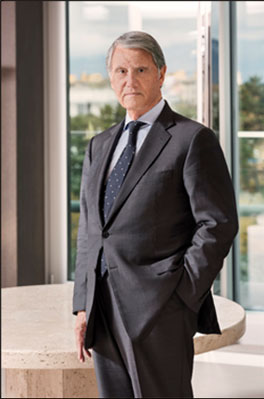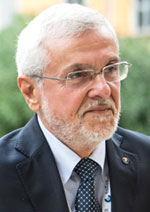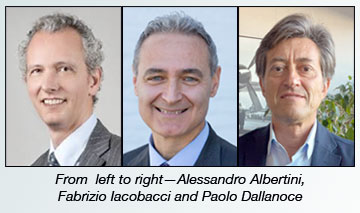

#INTHEAIREVERYWHERE
| |
 |
 #INTHEAIREVERYWHERE |
|
| Vol. 23 No. 15 | Thursday
April 4,
2024 |
|
| |
Eppur Si Muove |
 Eppur si muove (And yet it moves) is reportedly
the utterance that Galileo Galilei pronounced after being obliged by the
Inquisition to recant his findings that the Earth revolves around the Sun.
True or false the idea that he really pronounced this phrase, it has become
celebrated in Italy as a slightly rebellious exclamation that means a self-evident
truth is refuted against all evidence. In accepting Geoffrey’s invitation
to write again about my own country, I use this title today to express the
concept that the country seems to move anyway, despite the fact that many
Italians with power seem more intent to let it simmer down into oblivion,
whilst pretending to work for its development.
Eppur si muove (And yet it moves) is reportedly
the utterance that Galileo Galilei pronounced after being obliged by the
Inquisition to recant his findings that the Earth revolves around the Sun.
True or false the idea that he really pronounced this phrase, it has become
celebrated in Italy as a slightly rebellious exclamation that means a self-evident
truth is refuted against all evidence. In accepting Geoffrey’s invitation
to write again about my own country, I use this title today to express the
concept that the country seems to move anyway, despite the fact that many
Italians with power seem more intent to let it simmer down into oblivion,
whilst pretending to work for its development. In spite of all the adversities, uncertainties, two steps forward and three backward, and quite often against the short vision of our elected politicians, the country seems to be moving forward and has weathered the COVID crisis seemingly better than others, despite being one of the most heavily affected. At the same time, it is also suffering from an unfavourable demographic situation, counting one of the oldest population in the world. We live through a poisonous concoction of events and situations, but for one reason or another we seem to be able to survive and even manage to support an astronomical public indebtedness. In this frame of mind, I was struck by the news that Gianluigi Aponte, who owns a sizeable MSC-centric logistics empire and I consider one of the few remaining Italian successful entrepreneurs, has decided to buy Genoa’s historical Secolo XIX from John Elkann, who inherited the helm of the once upon a time largest industry in Italy, FIAT. FCA/FIAT controlled a galaxy of companies acquired in about a century of expansion, including several publishing activities. Apparently against his mother Magherita’s intentions, Elkann managed to distance much of his dominions in less than a decade, after Sergio Marchionne’s death. Angiolo Ori published two books about  the
powerful Agnelli
family following its parabolic path within Italian finance and the
powerful Agnelli
family following its parabolic path within Italian finance and  society
in great detail. Mr Ori died in 2004 and could not witness today’s
events that seem to splinter the once fortunate conglomerate. In fact the
fortunes of FIAT and its multiple subsidiaries were particularly noticeable
under the helm of two extraordinary managers, such as Vittorio
Valletta (left) and Sergio Marchionne, (right) but
are reduced today to the dimensions of a note on Wikipedia, at least in
Turin. society
in great detail. Mr Ori died in 2004 and could not witness today’s
events that seem to splinter the once fortunate conglomerate. In fact the
fortunes of FIAT and its multiple subsidiaries were particularly noticeable
under the helm of two extraordinary managers, such as Vittorio
Valletta (left) and Sergio Marchionne, (right) but
are reduced today to the dimensions of a note on Wikipedia, at least in
Turin.I heard the news of the media purchase on the radio this morning and then found more detail on First on Line a pretty original Italian publication. This is part of what they wrote a few hours ago: Gedi, the publishing company of La Repubblica and La Stampa controlled by Exor, has formalized the agreement with the MSC group for the sale of Il Secolo XIX. This newspaper, together with four related newspapers and their related digital and advertising activities, will come under the control of  the
tycoon Gianluigi Aponte's company. Maurizio Scanavino, (left) CEO
of Gedi, commented that the objective of the operation is to guarantee a
solid future for the historic Genoese newspaper, Il Secolo XIX, founded
in 1886 and owned by the Perrones for over a century.” The Perrone
dynasty owned several companies in Italy, including ANSALDO,
and were the publishers of Il Secolo XIX, until they sold it to GEDI. First
on line continues its article by noting that “[this] sale represents
a significant step in the sales’ path undertaken by Gedi, which has
already sold several local newspapers, such as Il Tirreno, La Nuova Ferrara,
La Gazzetta di Reggio, and many others, maintaining only the Provincia Pavese
and the Sentinella del Canavese. In line with the strategy of focusing on
national newspapers such as La Repubblica and La Stampa… (abridged)” the
tycoon Gianluigi Aponte's company. Maurizio Scanavino, (left) CEO
of Gedi, commented that the objective of the operation is to guarantee a
solid future for the historic Genoese newspaper, Il Secolo XIX, founded
in 1886 and owned by the Perrones for over a century.” The Perrone
dynasty owned several companies in Italy, including ANSALDO,
and were the publishers of Il Secolo XIX, until they sold it to GEDI. First
on line continues its article by noting that “[this] sale represents
a significant step in the sales’ path undertaken by Gedi, which has
already sold several local newspapers, such as Il Tirreno, La Nuova Ferrara,
La Gazzetta di Reggio, and many others, maintaining only the Provincia Pavese
and the Sentinella del Canavese. In line with the strategy of focusing on
national newspapers such as La Repubblica and La Stampa… (abridged)”In reality the news already surfaced in January, but was swiftly dismissed as unrealistic. After other significant investments in Italy (Italo), if Mr. Aponte decided to make such move I am convinced that not all is lost for the demographically weak Italians. As I see it, many strategic mistakes were made in recent years by concentrating most efforts in Milan, which is indeed shining under a bright light at the cost of depressing other areas of the country. Milan’s prices have unsurprisingly soared and I cannot see it as being positive, if Italians’ buying power is actually becoming poorer. I would much a prefer a more balanced approach . . . But Mr. Aponte’s proven acumen shows that something good can be done instead of adopting an approach that looks like a divesting addiction. On the other hand, I am not sure this optimism can be maintained when looking at my birthplace, Turin, where many of these industrial events took place. Again recently I read of another move that I do not appreciate: Eataly, one of last Turin’s excellences, is moving some of its essential functions to Milan, and this is in my view a regrettable, albeit predictable, change.  Speaking
of Milan, this gives me a nudge to go back to transport and logistics. On
March 26th and 27th, literally a few hours before this article appeared
on the screen of my computer, I watched and listened to a large and well
organised conference in Milan that was worth the effort: Shipping, Forwarding
& Logistics meet Industry. Speaking
of Milan, this gives me a nudge to go back to transport and logistics. On
March 26th and 27th, literally a few hours before this article appeared
on the screen of my computer, I watched and listened to a large and well
organised conference in Milan that was worth the effort: Shipping, Forwarding
& Logistics meet Industry.The geopolitical crisis of international trade was central at the eighth edition of Shipping, Forwarding & Logistics meet Industry. Africa and China were in the spotlight, with the uncertainties and opportunities for the Italian industrial system were taking front stage and a number of Italian high calibre speakers vied for the audience’s attention. The event was promoted by ALSEA and the International Propeller Clubs and gathered a professional audience in Milan at the Assolombarda Congress Centre and online.
Umberto Masucci, President of the International Propeller Clubs, Betty Schiavoni, Vice President of ALSEA and Riccardo Fuochi, President of the International Propeller Club Port of Milan, kicked the ball at the opening, and they were followed by many speakers who reviewed the circumstances that influence the logistics and maritime sector both from a geopolitical and environmental point of view in this day and age. The opening session was focussed on the geopolitical scenario in the Middle East, in particular the crisis in the Red Sea between the two choke-points in Suez Strait and Bab-el-Mandeb, which is understandably jeopardising the place and consequence of Italy in terms of global trade. Betty Schiavoni made the following remark: "Being a country mostly focussed on export, there is still too much inefficiency: our ports are not growing, airports are at a standstill. Now the Suez crisis could make things worse. We should work as a collaborative environment, instead of paying a price for not being able to reach an agreement." There were many sessions, which elicited greater or weaker interest as is natural: I was particularly struck by the presentation made by TARROS who sent to the meeting young and extremely professional ladies, who managed to throw a sign of optimism in the otherwise pensive audience. Their message was pretty simple in the end: challenges are difficult, but they also offer opportunities and the Mediterranean is full of challenges, hence full of opportunities . . .  Confetra’s Director General Giuseppe
Mele (left) spoke at the opening session, drawing attention to
the critical issues that the "Alpine Barrier" poses to the Italian
logistics system. According to DG Mele, a European Commission initiative
is needed for the Alpine Passes and Corridors. On this point, I think it
is impossible to ignore that, despite the involvement of the EU for a number
of years, neither Brenner, nor Fréjus
tunnels have been completed yet and we are basically left with century-old
infrastructures. In the same period Switzerland created two tunnels of the
same kind (Lötschberg
and Skt.
Gotthard), which have been in operation for years. In the meantime,
a landslide in France blocked the old Fréjus, so you must take a
train through Switzerland (or drive) if you wish to go to Lyon and Paris
from Turin and Milan. Many Italian ministers
for transport and infrastructure have been talking for years about developing
Alpine infrastructure that nobody has ever seen. In recent years, Italians
even managed to get a transport minister who openly tried to deconstruct
what he should in principle promote. No wonder Mr. Mele did not sound very
happy.
Confetra’s Director General Giuseppe
Mele (left) spoke at the opening session, drawing attention to
the critical issues that the "Alpine Barrier" poses to the Italian
logistics system. According to DG Mele, a European Commission initiative
is needed for the Alpine Passes and Corridors. On this point, I think it
is impossible to ignore that, despite the involvement of the EU for a number
of years, neither Brenner, nor Fréjus
tunnels have been completed yet and we are basically left with century-old
infrastructures. In the same period Switzerland created two tunnels of the
same kind (Lötschberg
and Skt.
Gotthard), which have been in operation for years. In the meantime,
a landslide in France blocked the old Fréjus, so you must take a
train through Switzerland (or drive) if you wish to go to Lyon and Paris
from Turin and Milan. Many Italian ministers
for transport and infrastructure have been talking for years about developing
Alpine infrastructure that nobody has ever seen. In recent years, Italians
even managed to get a transport minister who openly tried to deconstruct
what he should in principle promote. No wonder Mr. Mele did not sound very
happy. Cristina
Pensa (left) of Confindustria focused on supply chains, and observed
that reshoring is a strategy that is not desirable for Italy, given the
shortage of raw materials in the country. My personal opinion is that this
is not necessarily true, considering the fact that Italy seems to excel
in recycling, and this could be further developed. In my view, offshoring
Italian industrial production contributed to the systematic demolition of
much of the industrial system that was built after WWII and created an exceptional
period of development in Italy, but who am I to challenge the views of powerful
Confindustria . . . Cristina
Pensa (left) of Confindustria focused on supply chains, and observed
that reshoring is a strategy that is not desirable for Italy, given the
shortage of raw materials in the country. My personal opinion is that this
is not necessarily true, considering the fact that Italy seems to excel
in recycling, and this could be further developed. In my view, offshoring
Italian industrial production contributed to the systematic demolition of
much of the industrial system that was built after WWII and created an exceptional
period of development in Italy, but who am I to challenge the views of powerful
Confindustria . . . The morning session continued with a focus on Africa and China, where risks and opportunities were analysed. There is no certainty in this, but the impression was that opportunities in the Mediterranean still exist, even though Italy had given up on the Chinese Belt and Road Initiative.  The
meeting also hosted a prime-time session on air cargo. ANAMA published this
note on LinkedIn: “Yesterday the President of Anama, Alessandro Albertini,
was one of the speakers in #SFLmI2024 as part of the session dedicated to
#trasportoaereo (air transport) together with Paolo Dallanoce of SEA
Milan Airports and Fabrizio Iacobacci of #Assohandlers
underlining the importance of strengthening the airport community and the
synergy between public and private actors in the supply chain to build together
a strategy for the development of the national air cargo sector. In this
process, projects to digitalize the air cargo supply chain, #airportCommunitySystem
- collaborative data exchange platforms - play a decisive role, capable
of influencing process efficiency and performance measurement.” The
meeting also hosted a prime-time session on air cargo. ANAMA published this
note on LinkedIn: “Yesterday the President of Anama, Alessandro Albertini,
was one of the speakers in #SFLmI2024 as part of the session dedicated to
#trasportoaereo (air transport) together with Paolo Dallanoce of SEA
Milan Airports and Fabrizio Iacobacci of #Assohandlers
underlining the importance of strengthening the airport community and the
synergy between public and private actors in the supply chain to build together
a strategy for the development of the national air cargo sector. In this
process, projects to digitalize the air cargo supply chain, #airportCommunitySystem
- collaborative data exchange platforms - play a decisive role, capable
of influencing process efficiency and performance measurement.”The 6th edition of the Contship SRM Survey on the "logistics corridors" of the container sector was then presented and the study showed that 75% of Italian companies chose to sell their goods ex works, i.e. transferring of the entire transport process to the buyer of the goods, from factory to destination. This practice is in fact questionable, if you wish to maintain control on your export markets, as many in our sector have, so far unsuccessfully, tried to instil for years in Italian exporters’ choices. The event closed with a debate on the principles of Environmental Social Governance and digitalisation. The speakers voiced their hopes for a harmonised and shared regulatory system to protect competition and reduce the risk of green-washing. Tarros and Laghezza were asked to explain their ESG projects. In the second part, speakers shared their views on the gaps and achievements of the digitalisation process. Cherry-picking from their speeches there were repeated references to the political, legislative and geographical differences between European countries, the institution of port energy communities, as well as a collaborative model between all the players in the supply chain, through technology and paperless processes, e.g. the eFTI - Electronic Freight Transport Information EU Regulation. Other topics within the digitalisation agenda were mentioned: digital customs, eFBLs, e-CMRs and block-chain. In other words, it is all there, but you also get the impression that it is not quite there yet. Rail and intermodal sector, as well as urban logistics and e-commerce were also amply discussed and data on the growth of Italian e-commerce were presented (54.2 billion euros for 604 million B2C e-commerce shipments in 2023, i.e. + 13% compared to 2022), as well as future solutions for last-mile delivery: drones, parcel lockers and cargo bikes, curb-side management. In a way all that we have imagined in the 90s of last century is coming to fruition, only at glacial pace . . . They were two long days and, as it often happens in such situations, the desire to be noticed and relevant was almost drowning in the quantity of topics and the escalating number of different speakers. It was very welcome – and it was openly mentioned by the moderators during the meeting – that young professional women took the floor to give skilful presentations, thus reassuring us – were it necessary – that a decent future for Italian logistics will probably depend more on the availability of young and enthusiastic professionals rather than wise all-rounders. These certainly command respect, but they also need to make sure there is a generation behind them, who is able to take the challenge; my view is that their main mission should be providing the younger generation with the instruments to identify its own path to success. If there was one mistake made in Italian industry in the last few decades, dominated by first-class industrialists, was the inability to ensure transition. Italians emerging from WWII were impoverished and industrious and naturally tried to build better conditions for their scions in particular in terms of wealth, but the most important legacy is the ability to see a successful future and work for it, rather than sitting on a heap of money; this simple idea did not always make it through the next generation in many of our influential families. On the other hand, one could contend this is not peculiar to Italy only, but this is a competitive world and Italian logistics can thrive only if we join hands with our industry to ensure our high-end products reach our customers, preferably from Italy, without a glitch.  As
I said I have not always been impressed by the performance of my country
in recent years, but the
spark of a high heel this time came from ladies rather than boys and
gave this gathering an entirely original impression. I really hope our younger
generation will manage to re-appropriate the process that seems to have
been slipping through their fathers’ fingers. Eppur si muove! Thank
God it does, keeping fingers crossed. As
I said I have not always been impressed by the performance of my country
in recent years, but the
spark of a high heel this time came from ladies rather than boys and
gave this gathering an entirely original impression. I really hope our younger
generation will manage to re-appropriate the process that seems to have
been slipping through their fathers’ fingers. Eppur si muove! Thank
God it does, keeping fingers crossed.Marco Sorgetti |
If
You Missed Any Of The Previous 3 Issues Of FlyingTypers Access complete issue by clicking on issue icon or Access specific articles by clicking on article title |
||
 Vol 23 No. 11 Bow-tie Party For The Age of PayCargo Ingo On The Road Again Wim Will Always Be A Winner |
 Vol. 23 No. 12 A Hong Kong Humdinger IATA Priority ONE Record Chuckles for March 13, 2024 Think Tank WCS Hong Kong Three Big Words @ HACTL Great Day For The Irish |
|
Publisher-Geoffrey Arend • Managing
Editor-Flossie Arend • Editor Emeritus-Richard Malkin |
Send comments and news to geoffrey@aircargonews.com
|